Can You Use Pdf to Upload Labels
When a design client comes dorsum to you complaining that their printer says that the files you gave them are unusable, it's pretty embarrassing. As the professional, it's supposed to be your job to take care of the technical side of things, not the client'due south.
To assistance you lot avoid these types of situations, we've compiled a listing of some of the most common print file mistakes and how to gear up them. For the purposes of this post we are going to open up upwardly PDF files (a common file used for printing) in Adobe Illustrator to demonstrate common print file mistakes.
For the examples, we've used a total-bleed business carte pattern – this means that all graphics and images are supposed to extend all the way to the edge of the paper. No thing which program you lot utilize to create your print file in, it'southward ever good to provide an editable PDF file for your client and the printer.
PDF files are an awesome universal file format that can store high-res images, vector files, font information and more than! All clients need to view PDF files is Adobe Reader – and most printers have PDF files for print jobs.
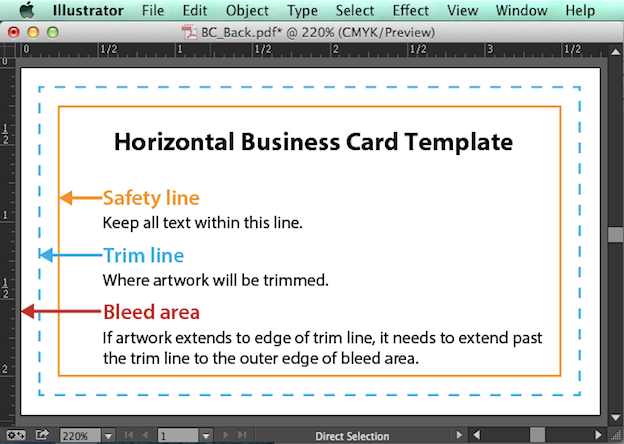
The image above is a bones 3.v″ 10 2″ business card template file. The document itself is 3.75″ x 2.25″ to accommodate a total bleed design. Here'south a breakdown of its components:
- The rubber line (orange box) is the area within which you should keep all text and graphics that you don't want to be cut off by the press motorcar.
- The trim line (dotted blueish line) is the line along which the carte is going to exist cut past the machine.
- The drain area (edge of paper) is the area that is going to be cutting off by the machine, but make sure that this area is filled with image and color so that there is no white space left on your card when it is trimmed.
We're going to include the trim line and the prophylactic line in the examples below to demonstrate many of the of the most common impress file mistakes. In final PDF impress files, the guidelines should always exist removed. Let's become started on some of the nigh mutual print file mistakes:
1. No drain areas included
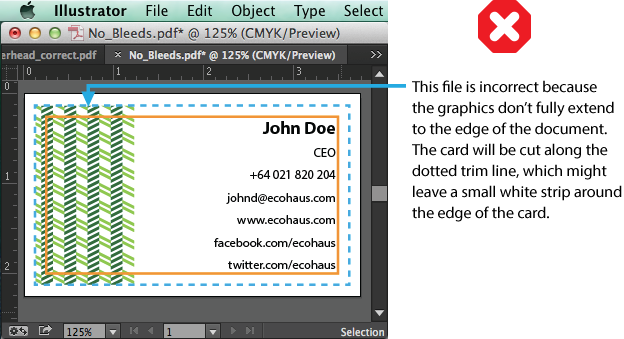
The examples above show what a file looks like when no drain surface area is included. This is probably the most common print file mistake out there. To ready files similar this, start with certificate dimensions that are at total bleed size, make sure that all graphics extend fully to the edge and keep text within the safety line.
ii. Text and graphics are non within the safe line
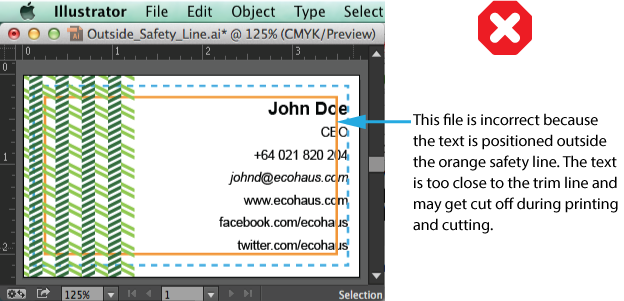
3. Incorrectly positioned borders
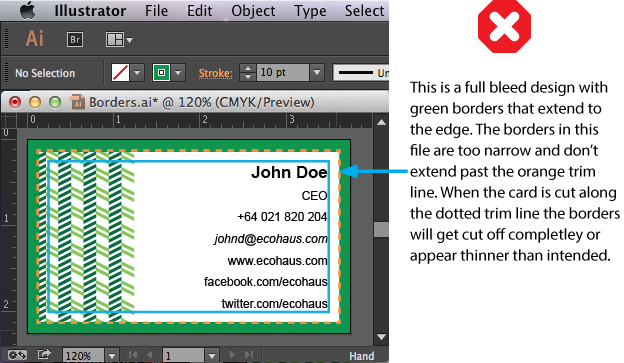
To solve this problem, making certain that all borders are either thick plenty or placed well inside the blue safety line. Many printers actually recommend against adding borders because their cutters don't always cut straight. To avoid this, consider non calculation borders to your design.
4. Artboard size doesn't match the size of the design
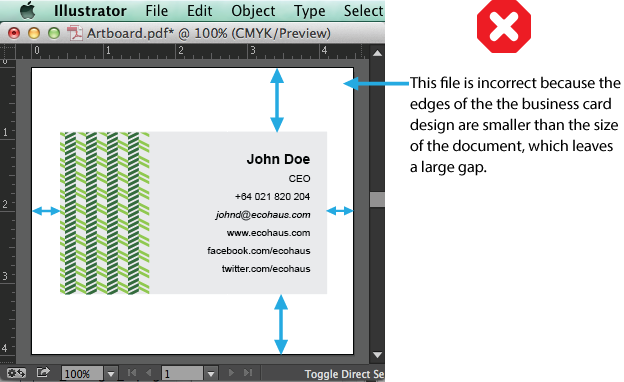
When creating your impress file the art board, or canvas must match up with the edges of your print pattern. This makes it easier for the printer to add printer marks. If the printer has to accommodate the dimensions of your file they may charge your client extra for that. To avoid this, start with a template file or fix your document so that it matches the dimensions of your design.
To set exact dimensions for your artboard, outset by create a new document in the Adobe program of your choosing by clicking File > New. A window will appear prompting you to type in the exact number values of the dimension of your document. This style, you lot can be sure that your certificate dimensions are verbal.
five. Leaving impress guide layers in the file
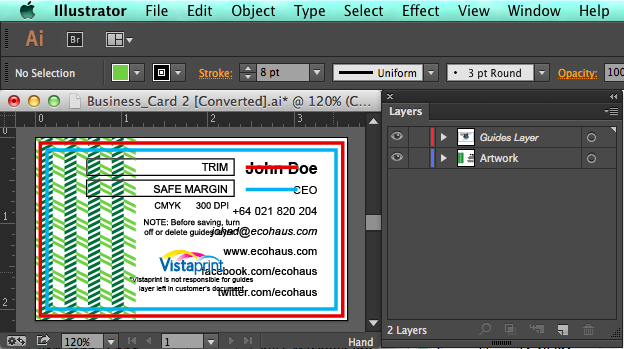
6. Colors are in RGB, non CMYK

To avoid dramatic color differences betwixt your on-screen and print designs, build out your designs in CMYK color manner first. Make sure that any images that are placed into the file are in CMYK besides. When you open a new file, make certain that your color manner is prepare to CMYK.
The image above shows to to cheque that your document is ready to CMYK color manner in Adobe Illustrator. It's besides ever a skilful idea to print at least 1 proof of the design, so that your client tin can check if they're happy with the colors in the print earlier they impress multiple copies of the design.
7. Resolution is too low
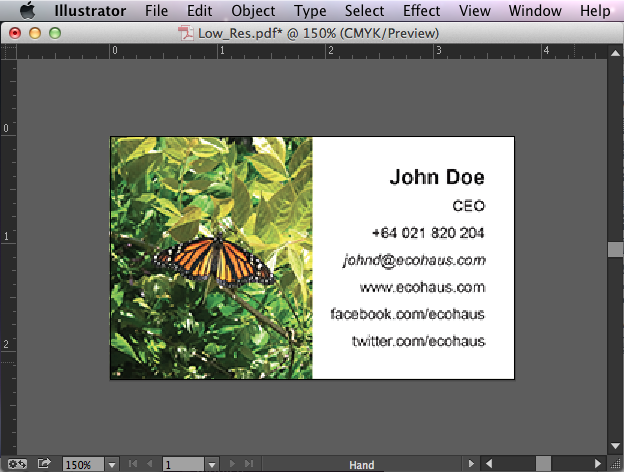
The images in the file to a higher place are set to well-nigh 72 PPI – not suitable for printing. Files needs to be at least 300 PPI for print jobs. To prepare this, set your document resolution to 300 PPI before you start creating your design. Also make sure that any raster images or photos that you employ are already prepare to 300 PPI earlier you place them in the print file.
Avoid sourcing your images from random websites, because the resolution will probably exist besides low – and because of copyright issues. Make sure that you use high resolution, print-quality epitome files from professional image sources.
8. Fonts aren't embedded or outlined

When creating your PDF files, make sure that you lot embed the fonts or outline them. To outline your fonts in Illustrator simply select your text and click Type > Create Outlines. Creating a PDF may embed a font by default setting but it never hurts to outline your fonts, just to be safe.
If you do outline your fonts, be sure that your customer legally owns the font in the design and that you give your client a version where the text is not outlined and then that the content can be edited subsequently. It's important to checking that you're non making these basic print file mistakes – some printers will charge your clients extra for fixing incorrect print files.
You want your clients to come to you with more print design jobs, and recommend your services, non the other way around. Now that we've gone through a bunch of bones print file mistakes, we'd like to provide a few examples of right, print-ready files.
The download links below contain correct, impress-ready, full-bleed PDF files of business card, letterhead and envelope designs. Feel free to download the files below and learn from them or check out our Templates Help Page for even more great data!
- Business Card_Back (PDF)
- Business Card Front end (PDF)
- Envelope #10 (PDF)
- Letterhead (PDF)
What other common print file mistakes have you seen? Share in the comments!
arkwookerumtraturness.blogspot.com
Source: https://99designs.com/blog/tips/print-file-mistakes-to-avoid/
0 Response to "Can You Use Pdf to Upload Labels"
Post a Comment